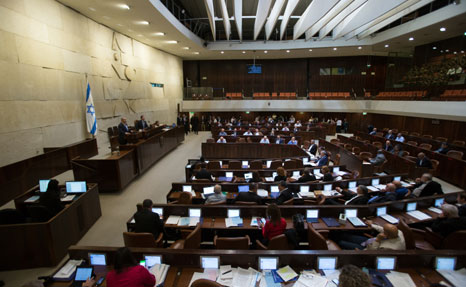Standing Up for Democracy
Unhealthy currents threaten to erode the democratic values upon which Israel’s survival and prosperity depend
One of the most fundamental principles of democratic government is the delicate system of checks and balances that prevents the arbitrary exercise of power by the majority. Israel, the sole democracy in a dangerous and unstable neighborhood, has long been an exemplar of these checks and balances. We cannot allow Israel's democratic foundations to gradually erode. Israel’s survival and prosperity hinge, in the final analysis, on its democratic vitality.

One of the most fundamental principles of democratic government is the delicate system of checks and balances that prevents the arbitrary exercise of power by the majority. Israel, the sole democracy in a dangerous and unstable neighborhood, has long been an exemplar of these checks and balances.
Unfortunately, in recent months, the democratic notion that a minister’s duty is to serve the interests of the public at large – and not only to the narrow constituency that chose him or her – seems to have been lost. Abraham Lincoln spoke famously of “government of the people, by the people and for the people.” Yet over the past year, Israeli ministers seem to have forgotten Lincoln’s ideal, acting brazenly to promote the narrow interests of the sectors that elected them. The justice minister is pushing for the selection of religious judges, the education minister is trying to introduce national-religious values into the public school system, the culture minister is restricting public funds to causes that promote the views of her constituency.
This same worldview has also fed the damaging trend for political appointments in the civil service. Ministers increasingly see these appointments not as opportunities to improve the quality of government service, but as opportunities to pay back political supporters by conferring upon them high-ranking jobs while making sure their allegiance is to the appointing minister rather than to the Israeli public. These politicians base their position on the groundless assertion that Israel’s proportional representation system has given them a broad public mandate for change – as if the voters of one party represent the majority, let alone the electorate as a whole. In the March 2015 elections, it should be recalled, a mere 25% of the electorate brought the Likud party to power. The damage of such political appointments cannot be exaggerated, and it is aggravated by an unstable electoral system that gives ministers an average term of 2 to 2.5 years in office.
Such irresponsible, short-sighted behavior on the part of senior elected officials alienates huge swaths of the electorate from the government. It is increasingly destroying faith in Israel’s democratic institutions. And it is weakening social solidarity, a key component of Israel’s national fortitude.
Recent polls of the prevailing view of government performance in Israel are revealing. A sizable proportion of Israelis hold that government corruption is common; 45.4 percent of the Jewish public and 60.8% of the Arab public think that Israel’s leadership is corrupt. A majority of Israelis (54.4%) feel that Knesset members do not work hard and are not doing their job as well as they should. A high percentage (77.7%) feel unable to influence government policy, and there is a pronounced lack of trust in key institutions of democracy. Trust in the government is 36.2%, trust in the Knesset is 35.4%, and trust in Israel’s political parties is only 19.1%.
This partisanship is particularly damaging in domains where governmental success depends upon minimal government intervention in content, such as in the media, in culture, and in science, technology, and higher education. It is especially dangerous in education, since Israel’s future as a vital democracy depends on the education its citizens receive; if Israeli children are not brought up on the values of liberty, equality, and justice, they may not grow up to become responsible citizens firmly committed to democratic ideals, but rather citizens hostile to the values of democracy.
If we allow this unhealthy situation to continue, it could gradually erode Israel’s democratic foundations. And Israel’s survival and prosperity hinge, in the final analysis, on its democratic vitality.
What can be done?
First, we must advocate for responsible leadership that sees Israel’s democratic values as an asset, not a liability.
Second, we must do more to educate the next generation – our children – to be responsible participants in a liberal-democratic nation-state.
And finally, we must stand up for Israel’s democratic values and ensure that irresponsible politicians do not sacrifice our way of life to populist pressures of the moment.
Prof. Mordechai Kremnitzer is Vice President of Research at the Israel Democracy Institute.
View the Jerusalem Report special section, "Israel's Democratic Challenge," featuring IDI>>
